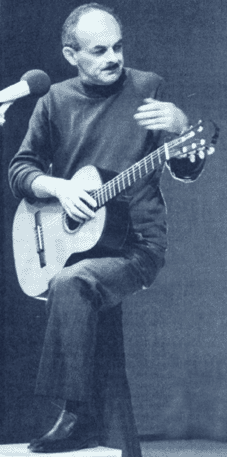presents
 Okudzhava, Bulat.
One of the Soviet Union's most beloved of bard poets, Bulat Okudzhava, was born in Moscow on 9 May 1924, to a Georgian father and an Armenian mother, both good communists.
Young Bulat grew up speaking only Russian because his mother insisted that only "the language of Lenin" be spoken
at home. As with many good communists, Okudzhava's father was arrested in 1937 and executed as a spy;
his mother was sent to the gulag for 18 years.
Okudzhava, Bulat.
One of the Soviet Union's most beloved of bard poets, Bulat Okudzhava, was born in Moscow on 9 May 1924, to a Georgian father and an Armenian mother, both good communists.
Young Bulat grew up speaking only Russian because his mother insisted that only "the language of Lenin" be spoken
at home. As with many good communists, Okudzhava's father was arrested in 1937 and executed as a spy;
his mother was sent to the gulag for 18 years.After his parents' arrest, Okudzhava lived with relatives in Tbilisi until 1941 when he was drafted into the Red Army. He served throughout the Great Patriotic War (World War II) in the infantry. Following the war, Okudzhava became a school teacher, first in a rural region, then in the city of Kaluga. He began writing poetry and had modest success. As Okudzhava recalled it, "I wrote the kind of poems that would not irritate anyone - neither the editors nor the public... Very comfortable poetry. I wrote for all the holidays and different seasons. Everyone was satisfied. Although somewhere there dwelled a worm of doubt. I understood that it was all too easy and not what it was supposed to be." In 1956, he moved to Moscow where he worked as an editor for the Young Guard publishing house and later as head of the poetry division for Literaturnaya Gazeta. In the mid-1950s, Okudzhava started to write music to accompany his poetry. The tunes were simple. At the beginning, Okudzhava knew only three chords; later he expanded his repertoire to a whole seven. Friends recorded his singing, and copies were widely distributed as magnitizdat (recorded samizdat). As Okudzhava's popularity grew, so, too, did a scandal. Okudzhava explained, "The composers hated me. The singers detested me. The guitarists were terrified by me. And that is how it went on, until a very well-known poet of ours announced: 'Calm down, these are not songs. This is just another way of presenting poetry.'" Okudzhava's songs are melodic and poetic and not overtly political. Nonetheless, they received no official publication until the late 1970s. Official recordings of his works began to appear in the 1980s, and in the fateful year of 1991, Bulat Okudzhava was awarded the USSR State Prize. Bulat Okudzhava died on 12 June 1997. |